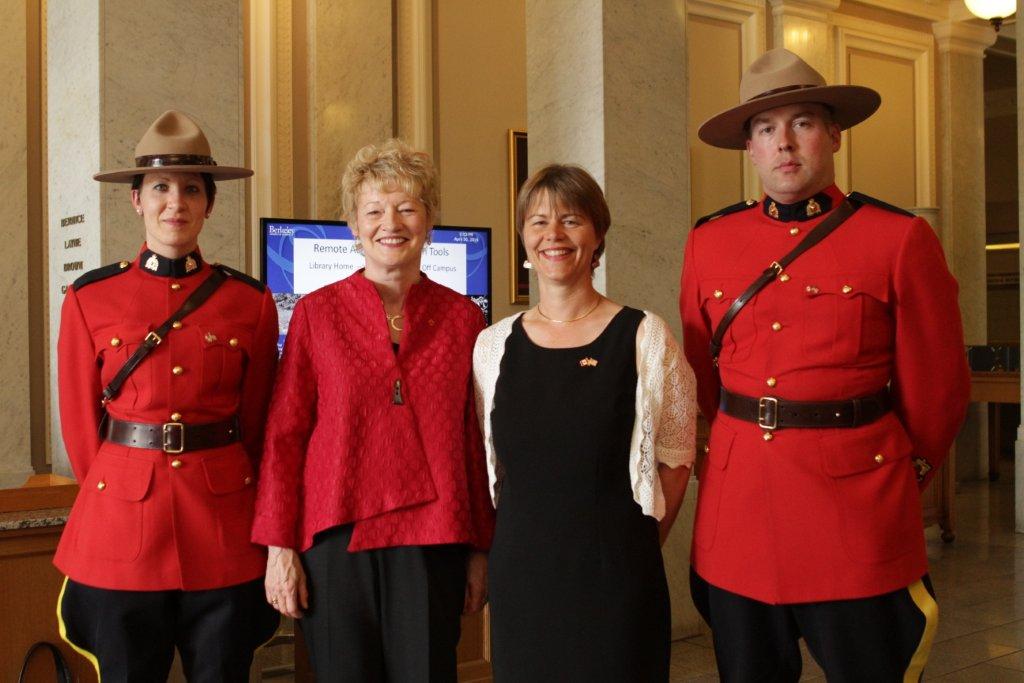
Irene Bloemraad
Irene Bloemraad (Ph.D. Harvard; M.A. McGill) is the Class of 1951 Professor of Sociology. She also serves as the Thomas Garden Barnes Chair of Canadian Studies at Berkeley, is the founding Director of the Berkeley Interdisciplinary Migration Initiative, and co-directs the Boundaries, Membership and Belonging program of the Canadian Institute for Advanced Research. In 2014-15, she was a member of the U.S. National Academies of Sciences committee reporting on the integration of immigrants into American society.
RESEARCH
I study how immigrants become incorporated into political communities and the consequences of migration on politics and understandings of membership. My research stands at the intersection of migration studies and political sociology, with a strong interdisciplinary (and international) scope. If you are curious, you can find links to my books and articles at the bottom of this page. You'll find that my research and writing fall into five overlapping areas:
(1) Citizenship & Membership – How do immigrants gain and claim political membership? In Becoming a Citizen, I compare how immigrants’ gain citizenship and participate in politics in the United States and Canada. I show how settlement assistance and an official policy of multiculturalism facilitate immigrants' political incorporation more in Canada than in the United States. In the context of current U.S. debates, my research suggests that immigration policy must focus not just on border control and entry, but also on integration and settlement policies. You can view a couple of video profiles of some of this research. In 2017, I worked with three colleagues to assemble the Oxford Handbook of Citizenship, a state-of-the-field overview of scholarship on citizenship. More recently, I've theorized understanding citizenship as claims-making and written about how immigrants and their children view being "American" and being a citizen. My interest in bridging empirical and normative scholarship on membership and migration has led me to co-teach a "Big Ideas" course with my law colleague, political theorist Sarah Song, as well as to co-direct the Boundaries, Membership and Belonging program with Queen's University philosopher Will Kymlicka. In this interview with grad students taking our first-year sociology theory course, I talk about explanatory and normative theory in migration studies, my journey to doing this kind of work, and some of the cutting-edge questions that I think confronts us in the theorization and study of migration.
(2) Immigrant Community Organizations – What role do community organizations play in immigrants' political influence, civic visibility and ability to access services? With Karthick Ramakrishnan (UCR) and Shannon Gleeson (Cornell), I've developed the idea of civic stratification, conceptualizing and documenting how immigrants face civic inequality and invisibility in the public sphere. Work in this area is featured in our co-edited book, Civic Hopes and Political Realities and Nonprofit and Voluntary Sector Quarterly. I've also worked with Gleeson and Els de Graauw (CUNY) on the spatial mismatch between where immigrants increasing live -- in diverse suburbs and bedroom communities -- and where nonprofit services are located, primarily in central cities, as we report in the American Journal Sociology. We recently published a state-of-the-field review of research on immigrant organizations for nonprofit scholars. (Find a brief video overview) A second review -- for sociologists -- was recently published by the Annual Review of Sociology (co-authored with Gleeson and Ali Chaudhary). I have also partnered with graduate student Cheng Ren to explore whether new Machine Learning and Natural Language Processing techniques can help identify immigrant organizations in large administrative datasets. (Somewhat to my surprise, we found that they can, and better than some standard techniques in existing scholarship.) I've also worked with graduate student Ethan Roubenoff to develop new ways to measure the spatial and demographic inequities between where immigrants live and their access to low-cost health care or legal assistance. The American Sociological Association produced a podcast about our research.
(3) Political Socialization in Mixed-Status Families – What effect does parents’ legal status have on US-born children’s civic and political incorporation? For this project, funded by the Russell Sage Foundation, my research team interviewed almost 200 Mexican-, Vietnamese- and Chinese-origin youth and their immigrant parents living in the Bay Area. Early results published in American Behavioral Scientist argue that political socialization, traditionally viewed as a parent-child dynamic, can also occur from children to parents. Subsequently, in a series of articles published in journals such as Studies in Law, Society and Politics, Journal of Ethnic and Migration Studies, and Ethnic and Racial Studies, I examine the importance of US birth, economic condition, ethno-racial background, law, culture, and ideas about diversity for one's sense of membership. This work suggests that birthright citizenship is an important, but incomplete, way to advance political and social inclusion.
(4) Diversity & Democracy – What are the implications of a more diverse population for democracy, civic life and public policies? What leads those in the native-born majority population to accept immigration or reject immigrant newcomers? In an article with Christel Kesler (Colby College) in the Canadian Journal of Political Science, we find that national institutions and policy environments mediate the relationship between diversity and social trust, civic engagement and political participation; diversity policies could enhance -- rather than depress -- civic activism in the right policy context. In articles that appeared in Perspectives on Politics and International Migration Review, Matthew Wright (UBC) and I show that despite politicians' backlash against multiculturalism, immigrants in countries with more diversity policies show similar or higher political trust, engagement, and attachment than those living in countries with more assimilationist policies. Multiculturalism might be good for democracy. In complementary research with colleagues Kim Voss (UCB) and Fabiana Silva (Michigan), we find that in making the case for immigrants to the general public, claims based on rights -- be they human or civil rights -- do not resonate much; rather, and perhaps surprisingly, appeals to American values or family unity appear to shift California voters to more inclusive notions of membership. This is an on-going project, with initial results published in Social Forces and the Journal of Ethnic and Migration Studies. (See a short video discussing results.) I am now working on an extension in Canada with colleague Allison Harell (UQAM).
My approach to the intersection of immigration and politics is capacious. It includes attention to citizenship, voting, and winning elected office; the establishment and maintenance of non-profit civic infrastructures, public opinion, policy and legislation, as well as social movement activism. Combining my interests in immigration and social movements, my colleague Kim Voss and I published an edited volume on the massive immigration rights protests of 2006, Rallying for Immigrant Rights. Voss and I are now working on a new project about pro-migrant social movements. Some early ideas from this project appeared in a special issue of the Journal of Ethnic and Migration Studies.
(5) Research Methods and Ethics - I have also written on comparative research methods, which flows in part from my undergraduate and graduate teaching on research methods. I've reflected on the disconnect between the neat research process depicted in textbooks (versus the messy reality) and the difficulty of articulating research puzzles. I've written about the benefits of comparative approaches to migration studies. And more recently, Cecilia Menjivar and I have elaborated some of the tensions between research ethics and calls for open science in research on migration.
TEACHING AND TRAINING
I have developed a range of classes related to migration at the graduate and undergraduate levels and I run an informal, interdisciplinary immigration workshop for those researching immigrant-related topics. I believe that excellence in research and teaching should go hand-in-hand. In 2013, I was award the American Cultures Innovation in Teaching prize, in 2012, I was honored with the campus’s Distinguished Teaching Award in Social Sciences, and in 2008 I received the Sarlo Distinguished Mentoring Award for my work with graduate students. For the last five years, Jennifer Van Hook (Penn State) and I have also been running a Summer Institute in Migration Research Methods. Beyond traditional undergraduate and graduate instruction, I've developed community service classes through the American Cultures Engaged Scholarship program. These combine academic learning with community internships in nonprofit organizations such the East Oakland Youth Development Center and Centro Legal de la Raza. (See some of this work with EOYDC).
MIGRATION STUIDES AT BERKELEY, AND BEYOND
Over the last two decades, I have worked to broaden and deepen immigration studies at Berkeley. (See the Berkeley NewsCenter article on some of these efforts, and students doing work in this area.) I spearheaded a collaborative effort with Berkeley colleagues to launch the Berkeley Interdisciplinary Migration Initiative.
Education also occurs beyond the university campus. I regularly give public talks, from students in grade 4 classrooms to seniors in retirement residences. I've written policy briefs and given presentations to elected officials and high-level government officials. Recently, colleagues and I wrote a background paper to World Development Report 2023, which is on Migrants, Refugees, and Societies. We drew on sociology, political science, social psychology and political philosophy to de-center a purely economic approach to understanding some of the political and social tensions around immigrant integration.
My interest in immigration comes from personal experience: I was born in Europe, moved to Canada as a young girl, and migrated to the United States in my early 20s. But immigration is also a vital issue to the state of California -- more than one in four state residents was born outside the United States -- and to many countries in the world.
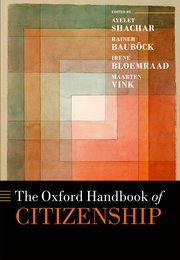
Oxford Handbook of Citizenship
Shachar, A., Bauböck, R., Bloemraad, I., Vink, M. (Eds.) 2017. Oxford University Press.
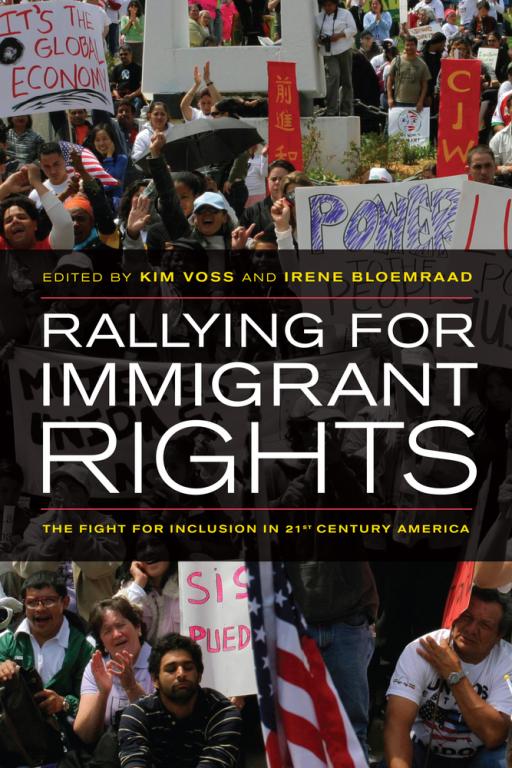
Rallying for Immigrant Rights
2011 Voss, K., Bloemraad, I. (Eds.). Berkeley: University of California Press.
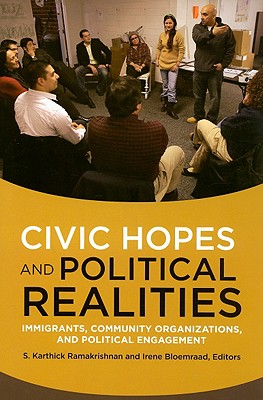
Civic Hopes and Political Realities: Immigrants, Community Organizations, and Political Engagement
2008 Ramakrishnan, S.K., Bloemraad, I. (Eds.). New York: Russell Sage Foundation Press.
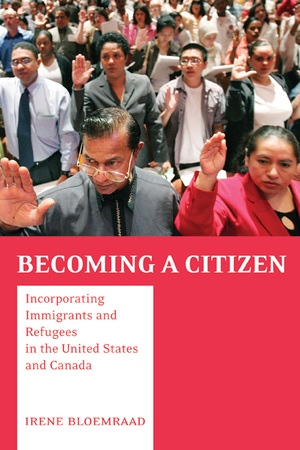
Becoming a Citizen: Incorporating Immigrants and Refugees in the United States and Canada
2006 Bloemraad, I. University of California Press.
Selected Articles and Chapters (click title for .pdf)
Roubenoff, E., Slootjes, J., Bloemraad, I. 2023. “Spatial and Sociodemographic Vulnerability: Quantifying Accessibility to Health Care and Legal Services for Immigrants in California, Arizona, and Nevada.” Socius 9.
Song, S., Bloemraad, I. 2022. “Immigrant Legalization: A dilemma between justice and the rule of law.” Migration Studies 10(3): 484-509.
Bloemraad, I., Chaudhary, A.R., & Gleeson, S. 2022. “Immigrant Organizations.” Annual Review of Sociology 48: 319-341.
Ren, C., Bloemraad, I. 2022. “New Methods and the Study of Vulnerable Groups: Using Machine Learning to Identify Immigrant-Oriented Nonprofit Organizations.” Socius 8: 1-14.
Bloemraad, I. 2022. “Claiming membership: boundaries, positionality, US citizenship, and what it means to be American.” Ethnic and Racial Studies 45(6): 1011-33.
Bloemraad, I., Menjívar, C. 2022. “Precarious Times, Professional Tensions: The Ethics of Migration Research and the Drive for Scientific Accountability.” International Migration Review 56(1): 4-32.
Bloemraad, I., Voss, K. 2020. “Movement or Moment? Lessons from the pro-immigrant movement in the United States and contemporary challenges.” Journal of Ethnic and Migration Studies 46(4): 683-704.
Voss, K., Silva, F., Bloemraad, I. 2020. “The Limits of Rights: Claims-making on Behalf of Immigrants.” Journal of Ethnic and Migration Studies 46(4): 791-819.
Bloemraad, I., Gleeson, S. de Graauw, E. 2020. “Immigrant Organizations: Civic Voice, Civic Inequality, and Civic Invisibility.” Pp. 292-313 in The Nonprofit Sector: A Research Handbook, 3rd Edition, edited by Walter W. Powell and Patricia Bromley.
Bloemraad, I., Hamlin, R. 2020. “Immigration, Asylum, Integration, and Citizenship Policy.” Pp. 880-908 in The New Handbook of Political Sociology. Edited by Joya Misra, Thomas Janoski, Cedric de Leon, and Stephanie Mudge. Cambridge University Press.
Bloemraad, I. 2018. “Theorizing Citizenship as Claims-Making.” Journal of Ethnic and Migration Studies 44(1): 4-26.
Bloemraad, I., Sheares, A. 2017. “Understanding Membership in a World of Global Migration: (How) Does Citizenship Matter?” International Migration Review 51(4): 823-867.
Warikoo, N., Bloemraad, I. 2017. “Economic Americanness and Defensive Inclusion: Social Location and Young Citizens’ Conceptions of National Identity.” Journal of Ethnic and Migration Studies. (on-line advanced publication)
de Graauw, E., Bloemraad, I. 2017. Working Together : Building Successful Policy and Program Partnerships for Immigrant Integration. Journal on Migration and Human Security 5(1): 105-123.
Bloemraad, I., Sarabia, H., Fillingim, A. 2016. “Staying out of Trouble” and Doing what is “Right:” Citizenship Acts, Citizenship Ideals and the Effects of Legal Status on Second-Generation Youth. American Behavioral Scientist 60(13) 1534–1552.
Bloemraad, I., Terriquez, V. (in-press, 2016) Cultures of Engagement: The Organizational Foundations of Advancing Health in Low-Income Communities of Color. Social Science and Medicine.
Bloemraad, I., Silva, F., Voss, K. 2016. Rights, Economics or Family? Frame Resonance, Political Ideology and the Immigrant Rights Movement. Social Forces 94(4): 1647-1674.
Hamlin, R., Bloemraad, I., de Graauw, E. 2016. Political Stories: Media Narratives of Political Participation by Asian Immigrants in the United States and Canada. Politics, Groups and Identities. 4(3): 425-443.
Bloemraad, I. 2015. “Re-imagining the Nation in a World of Migration: Legitimacy, Political Claims-making and Membership in Comparative Perspective.” Pp. 59-80 in Fear and Anxiety over National Identity, edited by Nancy Foner and Patrick Simon. New York: Russell Sage Foundation Press.
Fox, C., Bloemraad, I. 2015. “White by Law, Not in Practice: Explaining the Gulf in Citizenship Acquisition between Mexican and European Immigrants, 1930.” Social Forces 94(1): 181-207.
Bloemraad, I. 2015. Theorizing and Analyzing Citizenship in Multicultural Societies. The Sociological Quarterly 56(4): 591-606 .
Bloemraad, I., de Graauw, E., Hamlin, R. 2015. Immigrants in the Media: Civic Visibility in the United States and Canada. Journal of Ethnic and Migration Studies. 41(6): 874-896.
Bloemraad, I., Wright, M. 2014. “Utter Failure” or Unity out of Diversity? Debating and Evaluating Policies of Multiculturalism. International Migration Review 48(S1): S292-S334.
deGraauw, E., Gleeson, S., Bloemraad, I. 2013. Funding Immigrant Organizations: Suburban Free-riding and Local Civic Presence. American Journal of Sociology 119(1): 75-130.
Bloemraad, I., Provine, D.M. 2013. Immigrants and Civil Rights in Cross-National Perspective: Lessons from North America. Journal of Comparative Migration Studies 1(1): 45-68.
Chung, A., Bloemraad, I., Tejada, K. 2013. Reinventing an Authentic “Ethnic” Politics: Ideology and Organizational Change in Koreatown and Field’s Corner. Ethnicities. 13(6): 838–862.
Bloemraad, I. 2013. Accessing the Corridors of Power: Puzzles and Pathways to Understanding Minority Representation. West European Politics 36(3): 652-670.
Fox, C., Bloemraad, I., Kesler, C. 2013. “Immigration, Political Participation and Redistributive Social Policy.” Pp. 381-420 in Immigration and Poverty, edited by David Card and Steven Raphael. New York: Russell Sage Foundation Press.
Bloemraad, I., Schönwälder, K. 2013. Immigrant and Ethnic: Minority Representation in Europe: Conceptual Challenges and Theoretical Approaches. West European Politics 36(3): 564-579.
Bloemraad, I. 2013. Being American / Becoming American: Birthright Citizenship and Immigrants’ Membership in the United States. Studies in Law, Politics and Society 60: 55-84.
Bloemraad, I. 2013. The Promise and Pitfalls of Comparative Research Design in the Study of Migration. Migration Studies 1(1): 27-46.
Bloemraad, I. 2013. “The Great Concern of Government:” Public Policy as Material and Symbolic Resources. Pp. 195-208 in Outsiders no More? Models of Immigrant Political Incorporation, edited by Jennifer Hochschild, Jacqueline Chattopadhyay, Claudine Gay and Michael Jones-Correa. New York: Oxford University Press
Wright, M., Bloemraad, I. 2012. Is There a Trade-off Between Multiculturalism and Socio-Political Integration? Policy Regimes and Immigrant Incorporation in Comparative Perspective.” Perspectives on Politics 10(1): 77-95. Errata and corrections to figures.
- Best Article Award, Migration and Citizenship Section, American Political Science Association
Gleeson, S., Bloemraad I. 2012. Assessing the Scope of Immigrant Organizations: Official Undercounts and Actual Underrepresentation. Nonprofit and Voluntary Sector Quarterly.
Bloemraad, I., Gleeson, S. 2012. “Making the Case for Organizational Presence: Civic Inclusion, Access to Resources, and Formal Community Organizations.” Pp. 109-134 in Remaking Urban Citizenship: Organizations, Institutions, and the Right to the City, edited by Michael Peter Smith and Michael McQuarrie. New Brunswick, NJ: Transaction Publishers
Bloemraad, I. 2012. What the Textbooks Don’t Tell You: Moving from a Research Puzzle to Published Findings. Pp. 502-520 in Handbook of Research Methods in Migration, edited by Carlos Vargas-Silva. Cheltenham, UK: Edward Elgar Publishing.
Kesler, C., Bloemraad, I. 2010 Does Immigration Erode Social Capital? The Conditional Effects of Immigration-Generated Diversity on Trust, Membership, and Participation across 19 Countries, 1981-2000. Canadian Journal of Political Science 43(2): 319-347
Bloemraad, I., Trost, C. 2008. It’s a Family Affair: Inter-generational Mobilization in the Spring 2006 Protests. American Behavioral Scientist 52(4): 507-532.
Bloemraad, I. Korteweg, A., Yurdakul, G. 2008. Citizenship and Immigration: Multiculturalism, Assimilation, and Challenges to the Nation-State. Annual Review of Sociology 34: 8.1-8.27.
Ramakrishnan, S.K., Bloemraad, I. 2008. Introduction: Civic and Political Inequalities and “Making Organizations Count: Case Studies in California.” In Civic Hopes and Political Realities: Immigrants, Community Organizations, and Political Engagement, S. Karthick Ramakrishnan and Irene Bloemraad, eds. New York: Russell Sage Foundation Press.
Bloemraad, I. 2007. Unity in Diversity? Bridging Models of Multiculturalism and Immigrant Integration. DuBois Review: Social Science Research on Race 4(2): 317-336.
Bloemraad, I. 2006. Becoming a Citizen in the United States and Canada: Structured Mobilization and Immigrant Political Incorporation. Social Forces 85(2): 667-695.
Bloemraad, I. 2006. Citizenship Lessons from the Past: The Contours of Immigrant Naturalization in the Early Twentieth Century. Social Science Quarterly 87(5): 927-953.
Bloemraad, I, Ueda, R. 2006. Naturalization and Nationality. Pp. 36-57 in Companion to American Immigration, edited by Reed Ueda. Oxford: Blackwell.
Bloemraad, I. 2005. The Limits of de Tocqueville: How Government Facilitates Organizational Capacity in Newcomer Communities. Journal of Ethnic and Migration Studies 31(5): 865-887.
Bloemraad, I. 2004. Who Claims Dual Citizenship? The Limits of Postnationalism, the Possibilities of Transnationalism, and the Persistence of Traditionalism. International Migration Review 38(2): 389-426.
Bloemraad, I. 2001. Outsiders and Insiders: Collective Identity and Collective Action in the Quebec Independence Movement, 1995. Research in Political Sociology (The Politics of Social Inequality) Vol. 9: 271-305. Amsterdam: Elsevier.
